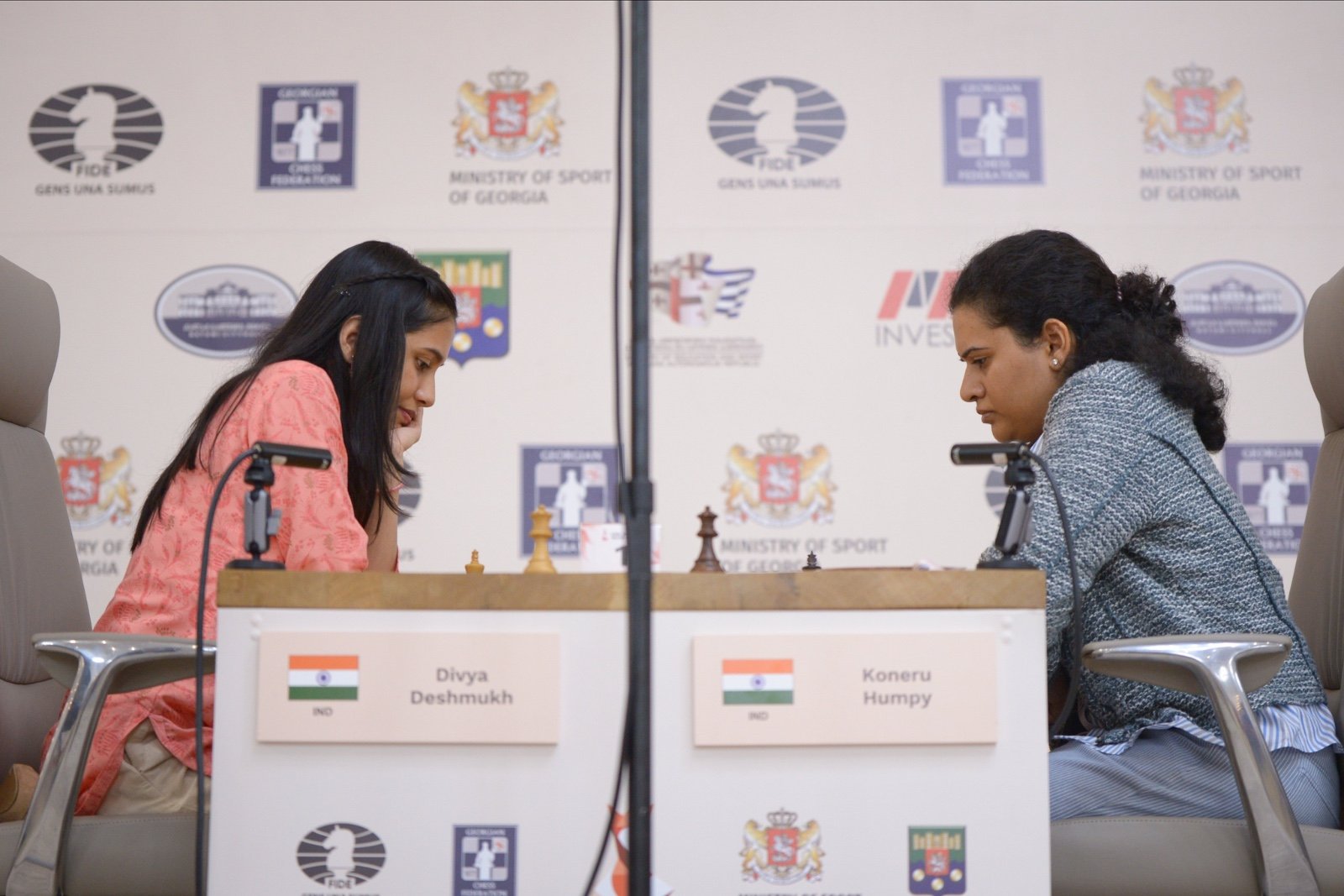The highly anticipated FIDE Women`s Chess World Cup final kicked off in Batumi, Georgia, with an all-Indian clash that lived up to its billing. Grandmasters Koneru Humpy, a veteran titan of the chessboard, and the prodigious rising star, Divya Deshmukh, locked horns in a tense Game 1 that ultimately concluded in a 41-move draw. While the score remains even, the game itself was a masterclass of shifting fortunes, strategic gambles, and nail-biting decisions, offering a tantalizing glimpse into the high stakes of this championship.
The Protagonists: Experience Meets Audacity
On one side stood Koneru Humpy, a name synonymous with Indian chess excellence. Her career is decorated with numerous accolades, embodying a calm, calculated approach honed over decades. Facing her was Divya Deshmukh, a young talent whose journey to the final has been marked by fearless play and an uncanny ability to upset higher-ranked opponents. This final isn`t just a contest for a coveted title; it`s a compelling narrative of experience versus youthful audacity, all unfolding under the global spotlight of the Women`s Chess World Cup.
Game 1: A Rollercoaster of Fortunes
The Opening Gambit: White`s Early Promise
Game 1 saw Divya Deshmukh, wielding the white pieces, open with confidence. The chosen battleground was the Queen`s Gambit Accepted, an opening known for its complex, strategic lines. Divya navigated the initial stages with precision, emerging with a discernible advantage. Even Humpy herself conceded after the game that she had “misplayed the lines,” a rare admission from a player of her caliber. By move 11, the emotionless algorithms of chess engines, those often-brutal arbiters of position, painted a strongly favored picture for Divya. The chessboard held a promise of an early breakthrough for the youngster.
The Elusive Advantage and Shifting Sands
However, the beauty and terror of chess lie in its dynamic nature. Converting an early advantage into a decisive victory is often the most challenging part. Divya, despite her strong position, found it increasingly difficult to press her advantage. The momentum, ever so subtly, began to shift. By move 14, the scales of balance had been reset, and the position was once again deemed even. It was a testament to Humpy`s defensive resilience and her ability to weather the storm, finding equilibrium even when on the back foot.
Time Pressure and a Refused Draw
As the game progressed, the clock became a silent, yet formidable, opponent. Divya, known for her thoughtful deliberation, found herself under severe time pressure, with less than five minutes remaining by move 25. It was in this crucible of limited time that one of the game`s most intriguing moments occurred. On move 29, Divya surprisingly refused a draw by three-fold repetition. A bold move, some might say audacious, especially when staring down a rapidly dwindling clock. It spoke volumes of her ambition and her desire to seize victory rather than settle for a half-point.
Her courage seemed almost vindicated on move 34, when Humpy made a slight inaccuracy by pushing her pawn to d5. The board offered Divya a glimmer of opportunity to capitalize on her opponent`s slip. Yet, in the high-stress environment of a World Cup final, finding the precise follow-up is an art form. Divya, perhaps constrained by time or the sheer complexity, couldn`t quite unearth the winning continuation.
The Inevitable Conclusion: A Pragmatic Draw
Ultimately, the ebb and flow of strategic maneuvers led to a familiar endpoint. On move 41, the players reached a position that had been repeated for the third time. This time, it was Humpy who claimed the draw. For the seasoned Grandmaster, securing a draw with the black pieces, especially after admitting an early misstep, is often considered a favorable outcome. It was a pragmatic decision, one that sets her up strategically for the next encounter.
Looking Ahead: The Decisive Game 2
The draw in Game 1 leaves the FIDE Women`s Chess World Cup final poised on a knife-edge. The spotlight now shifts to Sunday, July 27th, for Game 2, where Koneru Humpy will have the advantage of playing with the white pieces. Her tournament record with white has been impeccable – she remains unbeaten. This strategic edge is undeniable and will likely influence her approach to the next game, perhaps allowing her to play with more initiative and aggression.
Divya Deshmukh, despite her early advantage in Game 1 and her brave refusal of a draw, will need to regroup and counter Humpy`s expected onslaught with the white pieces. The pressure is immense, and every move will be scrutinized.
Should a winner not be decided by tomorrow evening, the ultimate fate of the World Cup title will be determined by a series of rapid and blitz tie-breaks on Monday. As the chess world holds its breath, the Batumi stage is set for a truly dramatic conclusion to this prestigious tournament.

